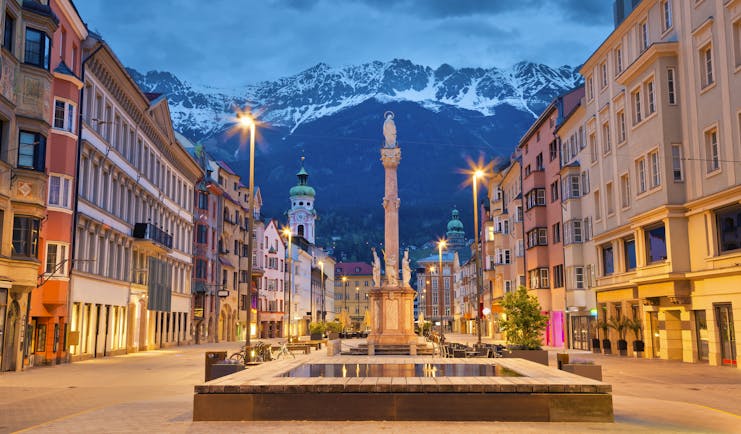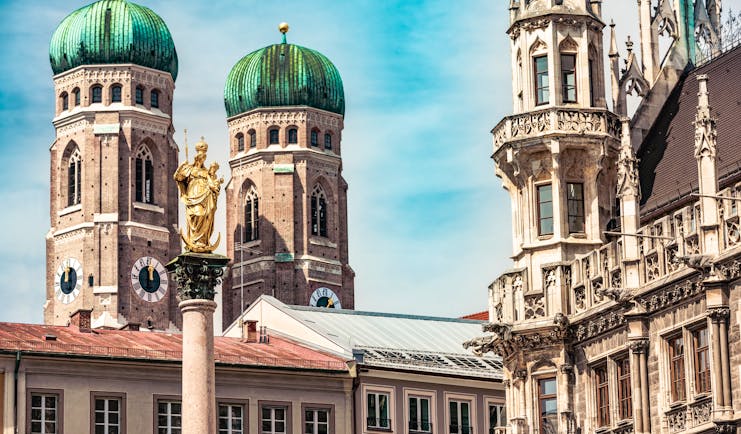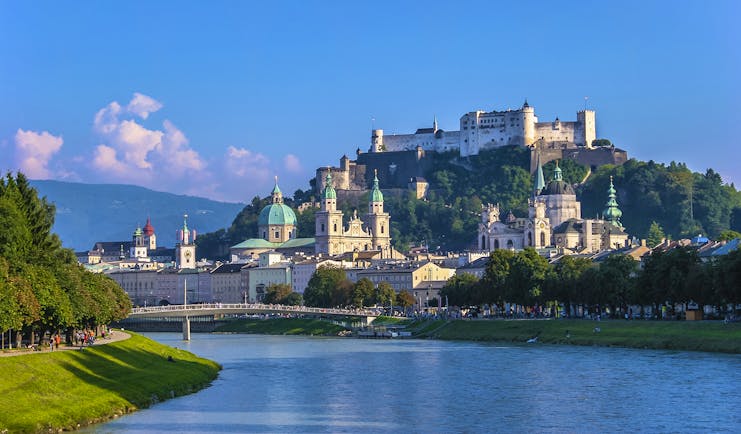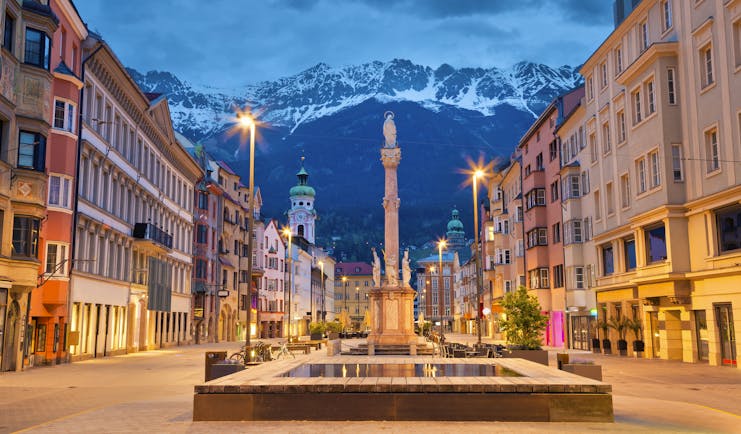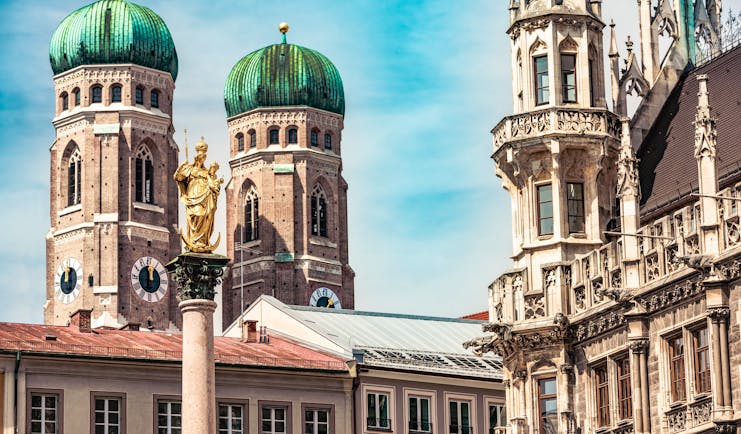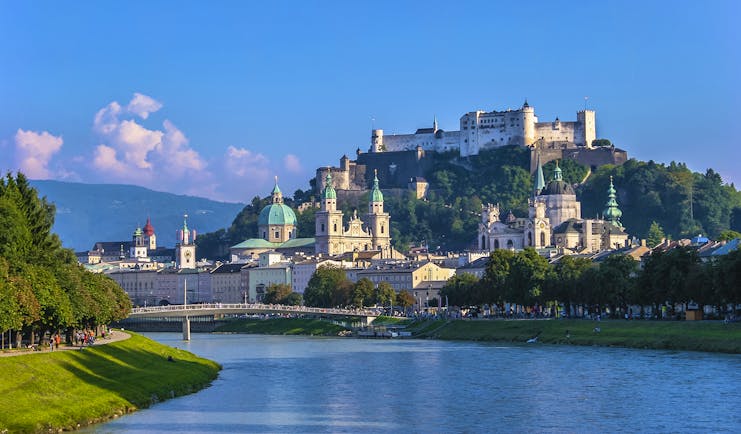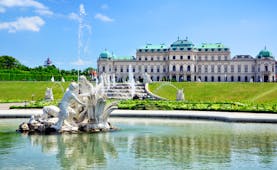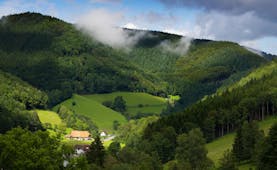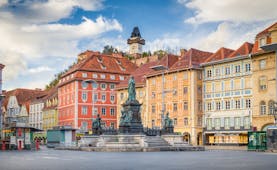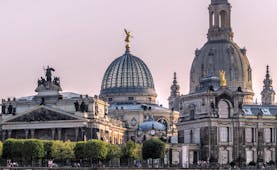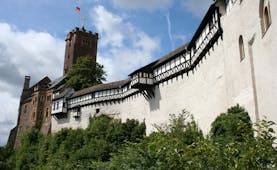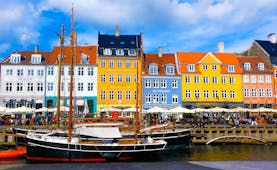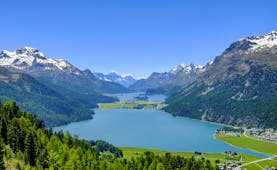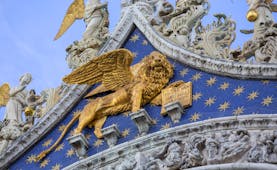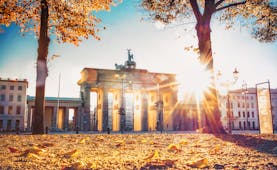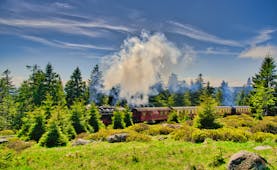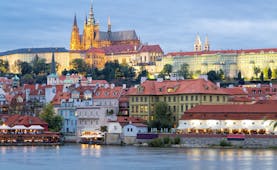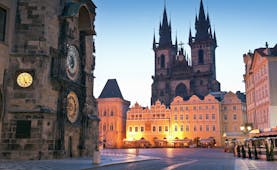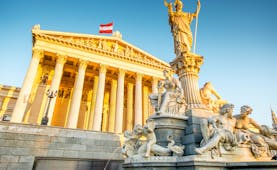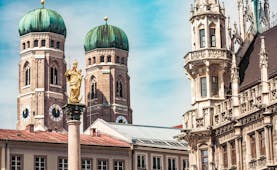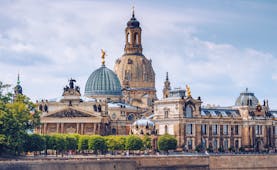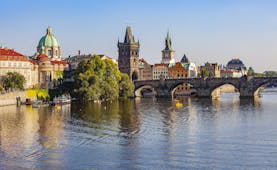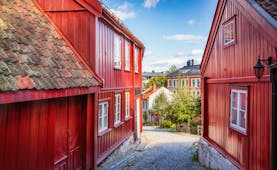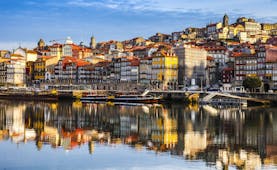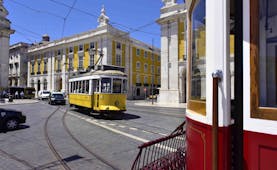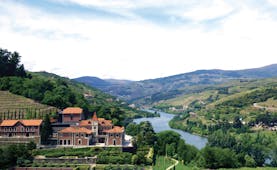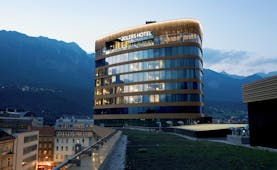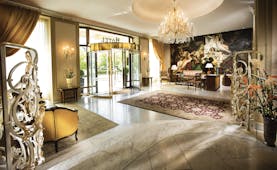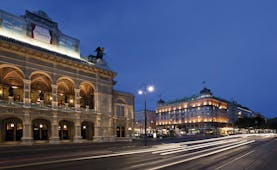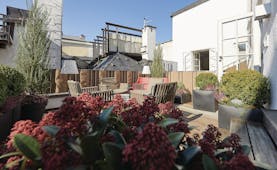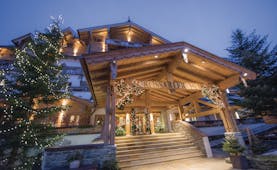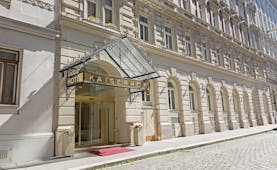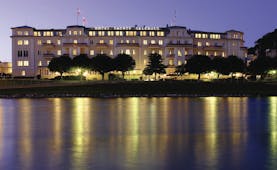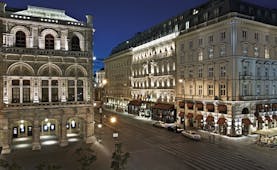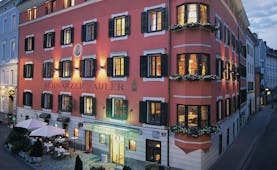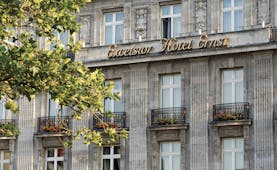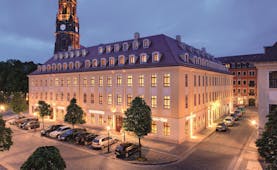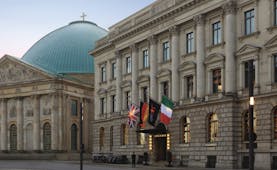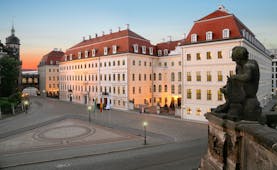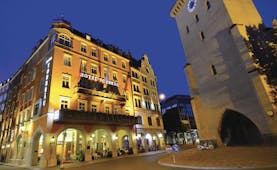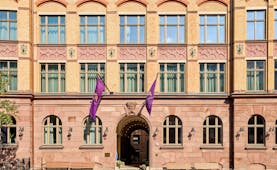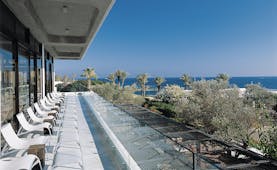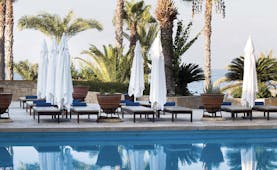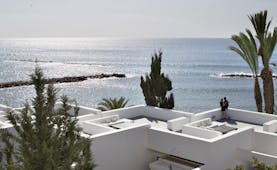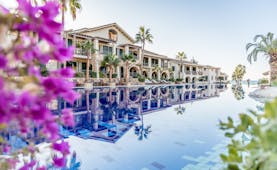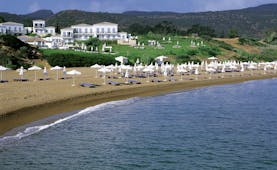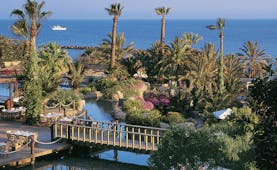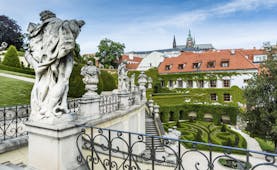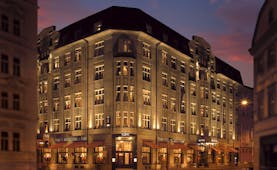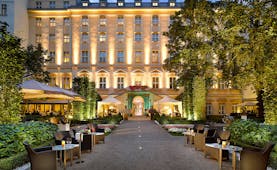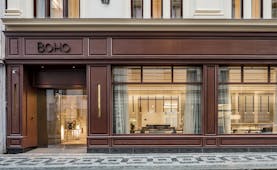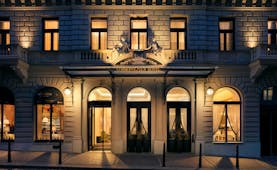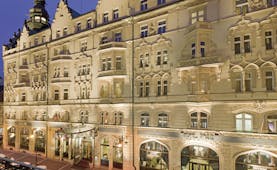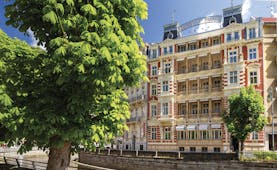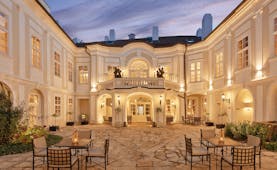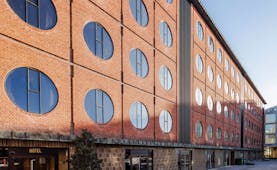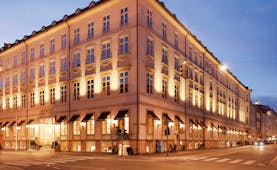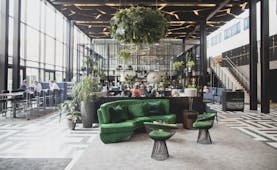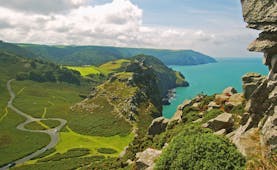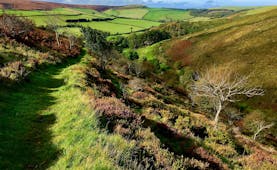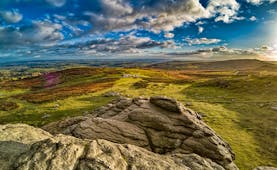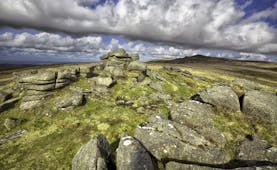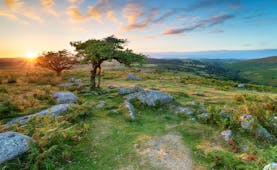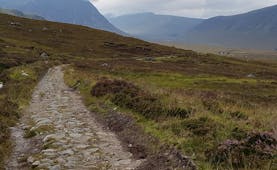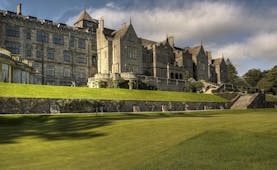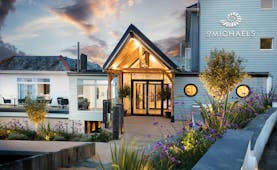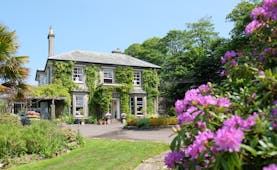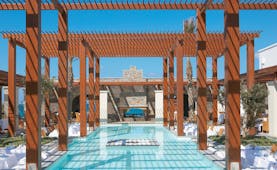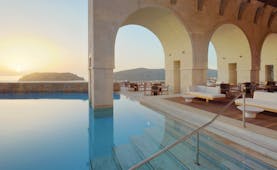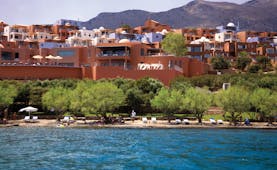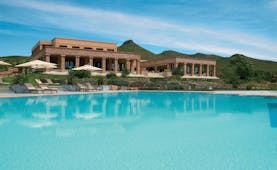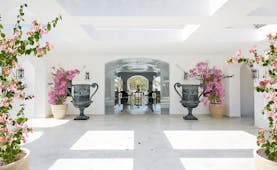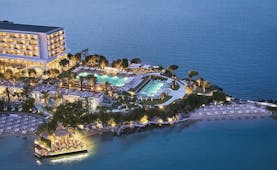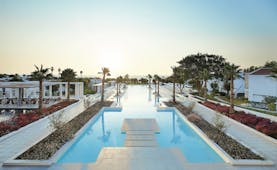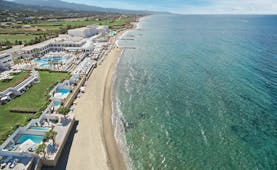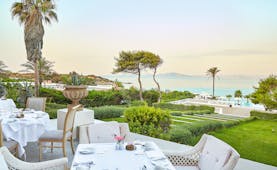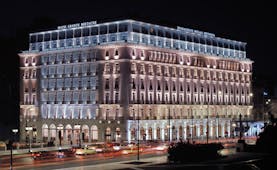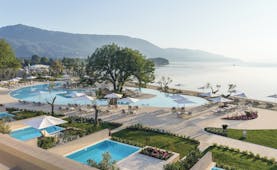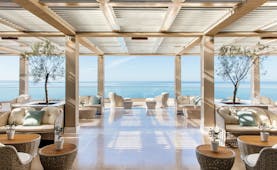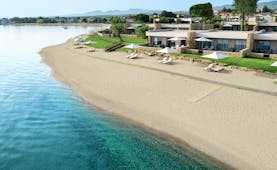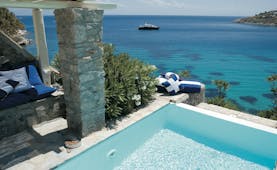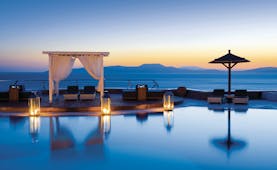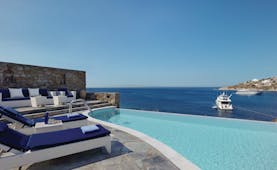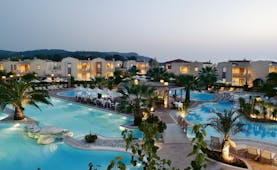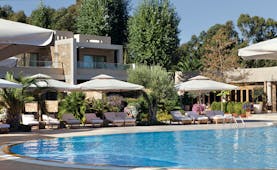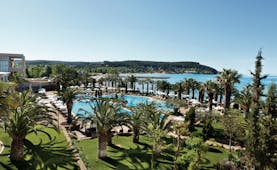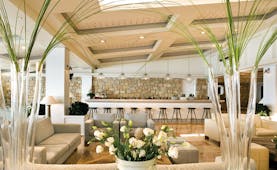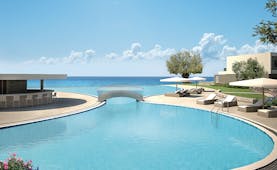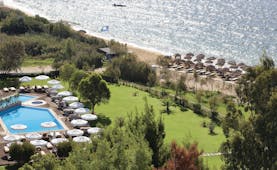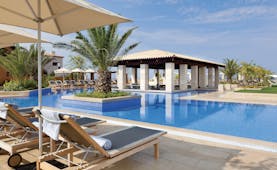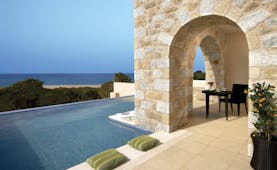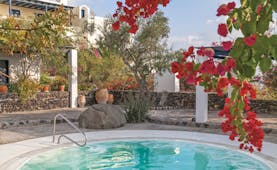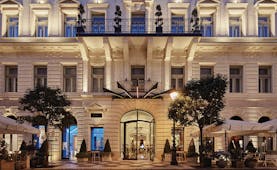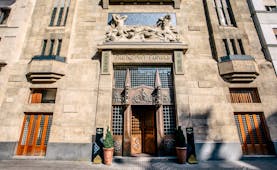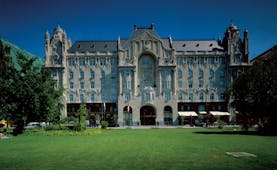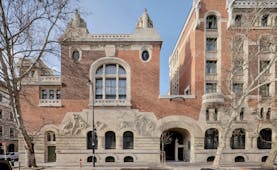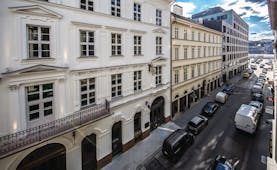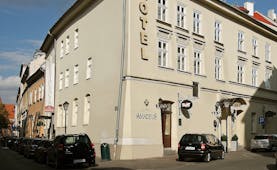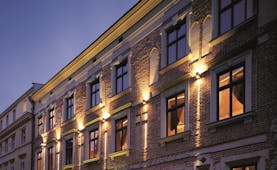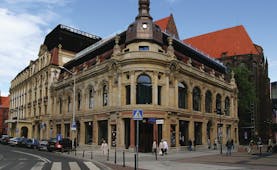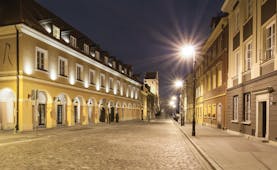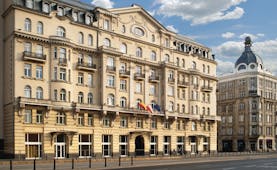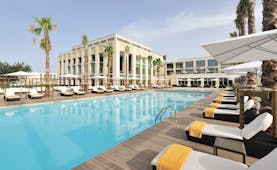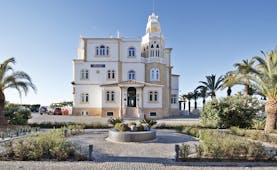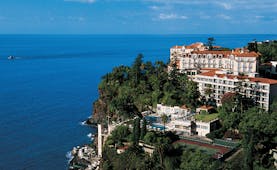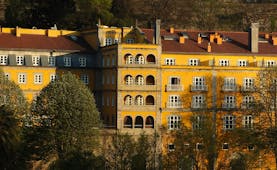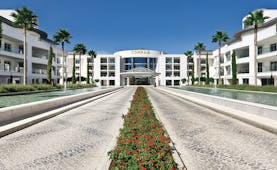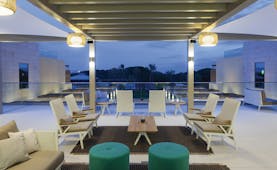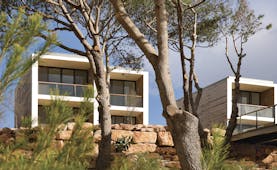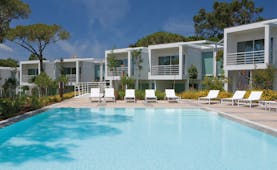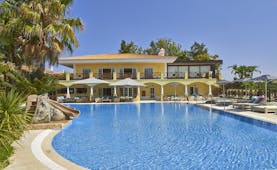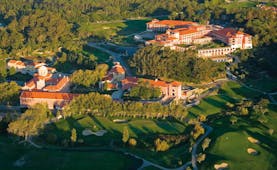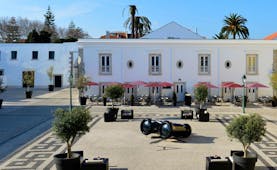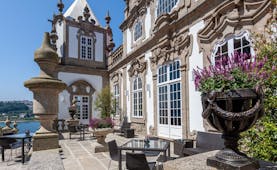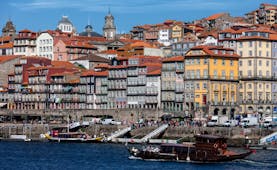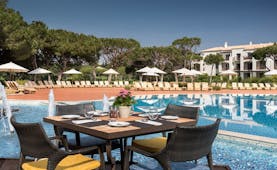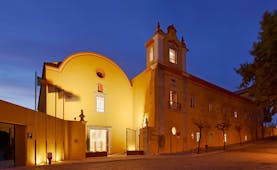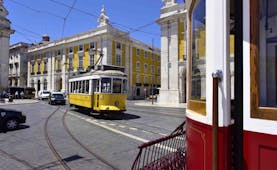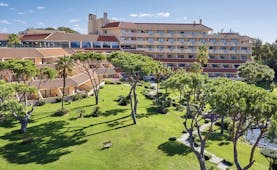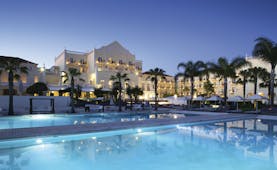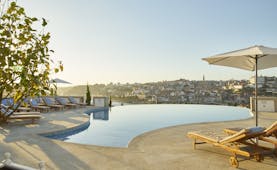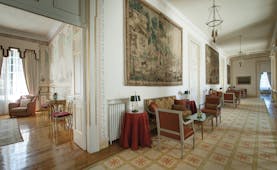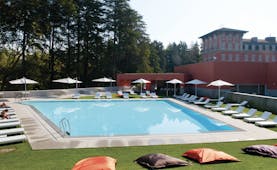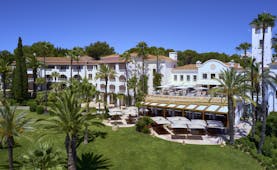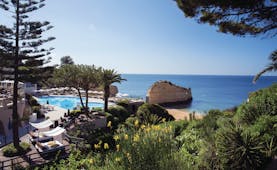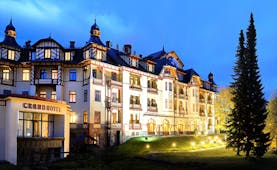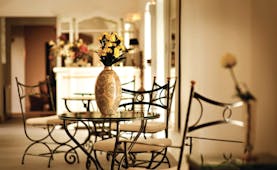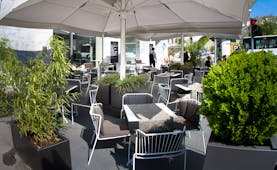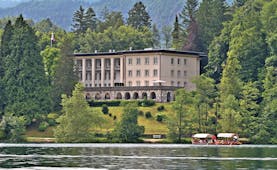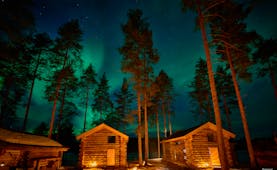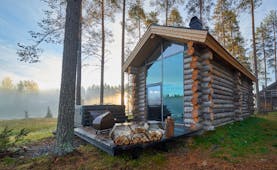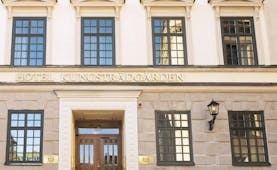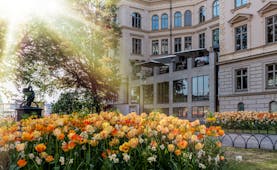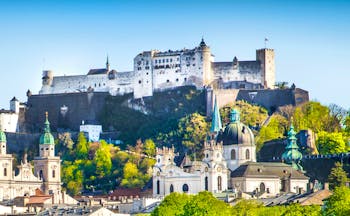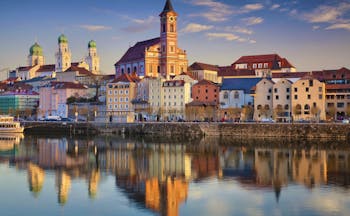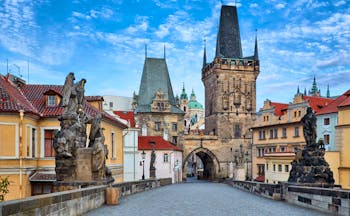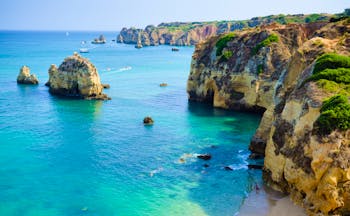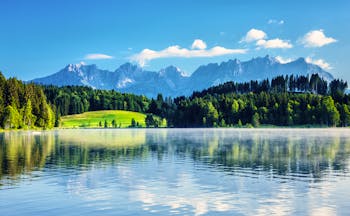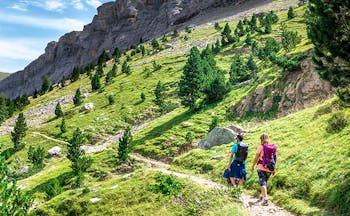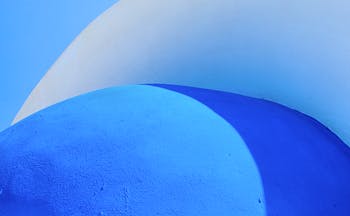Luxury rail holiday visiting ciities of the Austrian and Bavarian Alps
This 8-night touring holiday by train starts by taking the Eurostar from London to Amsterdam, where you will take the direct night train to Innsbruck. (You may also take the Eurostar to Brussels and then continue to Cologne where you catch the same night train further along the route between Amsterdam and Innsbruck). Awaken to the stunning Alpine scenery as you arrive in the Austrian Tirol: traditional haystacks, onion-domed churches and wayside chapels. Spend your days in Innsbruck exploring its array of architectural gems from the Gothic, Renaissance, Baroque and Neo-Classical period, as well as famous landmarks such as the Olympic ski jump. After two nights here the rail journey continues to Salzburg, the birthplace of Mozart, home to magnificent Baroque churches, imposing castles and elegant palaces. Your third and final city of the holiday is Munich, the capital of Bavaria, situated within sight of the Alps. Munich is a beautiful city with well-preserved historical buildings, palaces, gardens, imposing monuments and churches. At the heart of the city is the Marienplatz, home to the Old and New Town Halls (watch the famous Glockenspiel). Nearby is the Viktualienmarkt and the Frauenkirche as well as the Michaelskirche, which is the largest Renaissance church north of the Alps. From the centre the city fans out into boulevards, parks, gardens and imposing museums, including the famous Alte Pinakothek and Neue Pinakothek. Munich is also home to popular cultural festivals including the Oktoberfest and Fasching. After three nights here take the train back to London via Brussels, arriving back in the evening.
Highlights
Innsbruck • Chiemgau Alps • Salzburg • Munich
Day by day
You begin your rail touring holiday by travelling out by Eurostar from London St Pancras to Amsterdam or Brussels. From Amsterdam you join the NightJet sleeper train to Innsbruck which leaves at about 19.30 hrs. From Brussels you continue by train to Cologne where you join the same Nightjet sleeper at about 22.00 hrs. We recommend the two bed sleeper compartment on the NightJet train. There is a washbasin in the compartments and shared toilets in each carriage.
The sleeper train arrives in Innsbruck just after 9am, giving you the whole day to explore this city framed by mountains. Innsbruck is known worldwide for its ski resorts and its history of hosting winter sports competitions. To see its majesty first-hand you should take the Innsbrucker Nordkette, a cable car ride which leads up to part of Austria’s largest natural park. This takes roughly 20 minutes and gives awe-inspiring views of the city and its surrounding mountains. You can choose to go directly to the top or disembark at the various stations en route, each offering something different to do. Another way to see the city from above is the Hungerburg Funicular, a modern funicular which takes you up to the Hungerburg 860 metres above sea level. On a clear day you can see across to the Italian border. Perhaps Innsbruck’s most famous modern attraction is the Bergisel Ski Jump: this 90m slope has been used at both the Olympic Games and the World Championships. Innsbruck also has a variety of cultural sites to explore. The Hofburg (Imperial Palace) was constructed in the 15th century has a beautiful interior, now split into five themed museums detailing the history of Austria and in particular the Habsburgs. The Hofgarten located nearby is a more tranquil alternative and will give you chance to get away from the crowds for a time whilst you enjoy the ponds and array of plant life. Slightly further out of the centre is Ambras Castle, once home to the historical figure Archduke Ferdinand II.
Enjoy breakfast at your hotel and board a direct train to Salzburg where you will arrive in under two hours. As you leave Innsbruck, ski slopes are visible in the distance, and you know that Kitzbuehel is off to the south-east. At Kufstein the train crosses into Germany and the landscape flattens slightly with fields and forests, yet the Chiemgau Alps are in the near distance. The train travels to the south of the Chiemsee and then Austria approaches once more. There is a spectacular although fleeting moment as the train crosses the river Salzach and on the right you are dazzled by the spires and turrets of the old city of Salzburg and Festung Salzburg on the hill-top on the horizon. Check in to your hotel for a stay of two nights.
You have a full day in Salzburg to discover this compact and very attractive city. Famous for being the birthplace of Mozart and the location for “The Sound of Music”, there are also numerous gardens and intricate architecture to enjoy, notably striking Baroque churches and buildings designed by Fischer von Erlach. The often piercing green-grey waters of the Salzach River flow through the city centre and the old town is on the left bank where you can find the Hohensalzburg Fortress, an 11th century castle which sits upon the Festungsberg. Other places of interest include the Mirabell Palace Gardens – a UNESCO World Heritage Site – and Mozart’s birthplace, a museum which tells the compelling story of his life, relationships and musical inspirations. Today, the Salzburg Festival in July and August each year offers an array of opera, music and drama.
After a leisurely breakfast in Salzburg, board a direct rail service to Munich which will take around an hour and a half. Sitting on the left side of the train will give you amazing views of the Alps as you leave Salzburg. In the foreground are the landscapes of the Chiemgau, the foothills of the Alps. The scenery becomes less mountainous as you approach Munich and is replaced instead with fields and Bavarian farmland. Arrive into Munich and check-in to your hotel for your final three nights.
Munich, the capital of Bavaria, is situated within sight of the Alps. Munich is an elegant and beautiful, affluent German city with well-preserved historic buildings, palaces, gardens, imposing monuments and churches. At the heart of the city is the Marienplatz, home to the Old and New Town Halls (watch the famous Glockenspiel). Nearby is the Viktualenmarkt and the Frauenkirche as well as the Michaelskirche, which is the largest Renaissance church north of the Alps. From the centre the city fans out into boulevards, parks, gardens and imposing museums, including the famous Alte Pinakothek and Neue Pinakothek. The Residenz palace is a feast of architectural styles combining Renaissance, Baroque, Rococo and Classicism. There are 130 rooms filled with rich furniture, paintings and tapestries. The English Garden is one of the largest urban gardens in the world and it offers restaurants, teahouse and beer gardens. Further afield you find Baroque palaces such as Nymphenburg, BMW headquarters and the Olympic Park from 1972. Munich is also home to popular cultural festivals including the Oktoberfest and Fasching. If you want to venture out of Munich, why not take a trip to Neuschwanstein Castle (journey by train about 2 hours each way).
Depart from Munich just before 9am to return to Brussels with one change in Siegburg. Check in for your Eurostar back to London. You arrive into St Pancras in the evening.
My daughter and I had a fabulous time on our holiday. The hotels were all spectacular in their different ways, the train journeys were exciting and gorgeous scenery and the organisation from the various rail networks was spot on.Mrs B, June 2022
Holiday price guide From £2,120 per person based on two people sharing a double or twin room and including second class rail travel. First class and standard premier on Eurostar supplement of £380 per person.
Holiday Code EEBR12
Call us on 01392 441245
Luxury rail holiday visiting ciities of the Austrian and Bavarian Alps
You begin your rail touring holiday by travelling out by Eurostar from London St Pancras to Amsterdam or Brussels. From Amsterdam you join the NightJet sleeper train to Innsbruck which leaves at about 19.30 hrs. From Brussels you continue by train to Cologne where you join the same Nightjet sleeper at about 22.00 hrs. We recommend the two bed sleeper compartment on the NightJet train. There is a washbasin in the compartments and shared toilets in each carriage.
The sleeper train arrives in Innsbruck just after 9am, giving you the whole day to explore this city framed by mountains. Innsbruck is known worldwide for its ski resorts and its history of hosting winter sports competitions. To see its majesty first-hand you should take the Innsbrucker Nordkette, a cable car ride which leads up to part of Austria’s largest natural park. This takes roughly 20 minutes and gives awe-inspiring views of the city and its surrounding mountains. You can choose to go directly to the top or disembark at the various stations en route, each offering something different to do. Another way to see the city from above is the Hungerburg Funicular, a modern funicular which takes you up to the Hungerburg 860 metres above sea level. On a clear day you can see across to the Italian border. Perhaps Innsbruck’s most famous modern attraction is the Bergisel Ski Jump: this 90m slope has been used at both the Olympic Games and the World Championships. Innsbruck also has a variety of cultural sites to explore. The Hofburg (Imperial Palace) was constructed in the 15th century has a beautiful interior, now split into five themed museums detailing the history of Austria and in particular the Habsburgs. The Hofgarten located nearby is a more tranquil alternative and will give you chance to get away from the crowds for a time whilst you enjoy the ponds and array of plant life. Slightly further out of the centre is Ambras Castle, once home to the historical figure Archduke Ferdinand II.
Enjoy breakfast at your hotel and board a direct train to Salzburg where you will arrive in under two hours. As you leave Innsbruck, ski slopes are visible in the distance, and you know that Kitzbuehel is off to the south-east. At Kufstein the train crosses into Germany and the landscape flattens slightly with fields and forests, yet the Chiemgau Alps are in the near distance. The train travels to the south of the Chiemsee and then Austria approaches once more. There is a spectacular although fleeting moment as the train crosses the river Salzach and on the right you are dazzled by the spires and turrets of the old city of Salzburg and Festung Salzburg on the hill-top on the horizon. Check in to your hotel for a stay of two nights.
You have a full day in Salzburg to discover this compact and very attractive city. Famous for being the birthplace of Mozart and the location for “The Sound of Music”, there are also numerous gardens and intricate architecture to enjoy, notably striking Baroque churches and buildings designed by Fischer von Erlach. The often piercing green-grey waters of the Salzach River flow through the city centre and the old town is on the left bank where you can find the Hohensalzburg Fortress, an 11th century castle which sits upon the Festungsberg. Other places of interest include the Mirabell Palace Gardens – a UNESCO World Heritage Site – and Mozart’s birthplace, a museum which tells the compelling story of his life, relationships and musical inspirations. Today, the Salzburg Festival in July and August each year offers an array of opera, music and drama.
After a leisurely breakfast in Salzburg, board a direct rail service to Munich which will take around an hour and a half. Sitting on the left side of the train will give you amazing views of the Alps as you leave Salzburg. In the foreground are the landscapes of the Chiemgau, the foothills of the Alps. The scenery becomes less mountainous as you approach Munich and is replaced instead with fields and Bavarian farmland. Arrive into Munich and check-in to your hotel for your final three nights.
Munich, the capital of Bavaria, is situated within sight of the Alps. Munich is an elegant and beautiful, affluent German city with well-preserved historic buildings, palaces, gardens, imposing monuments and churches. At the heart of the city is the Marienplatz, home to the Old and New Town Halls (watch the famous Glockenspiel). Nearby is the Viktualenmarkt and the Frauenkirche as well as the Michaelskirche, which is the largest Renaissance church north of the Alps. From the centre the city fans out into boulevards, parks, gardens and imposing museums, including the famous Alte Pinakothek and Neue Pinakothek. The Residenz palace is a feast of architectural styles combining Renaissance, Baroque, Rococo and Classicism. There are 130 rooms filled with rich furniture, paintings and tapestries. The English Garden is one of the largest urban gardens in the world and it offers restaurants, teahouse and beer gardens. Further afield you find Baroque palaces such as Nymphenburg, BMW headquarters and the Olympic Park from 1972. Munich is also home to popular cultural festivals including the Oktoberfest and Fasching. If you want to venture out of Munich, why not take a trip to Neuschwanstein Castle (journey by train about 2 hours each way).
Depart from Munich just before 9am to return to Brussels with one change in Siegburg. Check in for your Eurostar back to London. You arrive into St Pancras in the evening.
My daughter and I had a fabulous time on our holiday. The hotels were all spectacular in their different ways, the train journeys were exciting and gorgeous scenery and the organisation from the various rail networks was spot on.Mrs B, June 2022
Holiday price guide From £2,120 per person based on two people sharing a double or twin room and including second class rail travel. First class and standard premier on Eurostar supplement of £380 per person.
Holiday Code EEBR12
Our prices include
● Rail travel from London throughout, back to London
● Second-class travel on all trains (first class and standard premier on Eurostar can be booked at a supplement)
● 2-person sleeper cabin from Amsterdam or Cologne to Innsbruck
● 2 nights’ bed and breakfast in a Classic double room at Schwarzer Adler Hotel, Innsbruck
● 2 nights’ bed and breakfast in a Double room at Hotel Goldgasse, Salzburg
● 3 nights’ bed and breakfast at Hotel Torbräu, Munich
● Concierge service and Expressions Holidays regional helpful hints
Our prices do not include
● Early check-in or late check-out at any hotels (although we can arrange this on request at additional cost)
● Any other services not mentioned above, such as transfers and meals except breakfast at hotels
● Personal holiday insurance. This is essential and cover should be in place from when you book the holiday.
● Local tourist tax, usually between Euros 1 and 3 per person per night, and payable locally to the hotel
● Transfers in any cities
Additional information This holiday can be arranged throughout the year. Timings can vary depending on the month and day of the week.
Call us on 01392 441245
Luxury rail holiday visiting ciities of the Austrian and Bavarian Alps
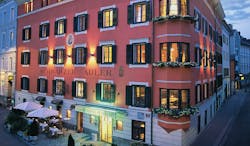
Hotel Schwarzer Adler is a cosy and characterful 4-star boutique hotel, housed in a historic building in the centre of Innsbruck. Delicious local cuisine and luxurious wellness facilities make it an idyllic retreat in a beautiful Alpine location.
Classic double room
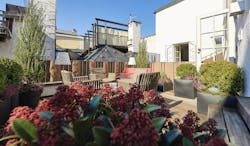
The Hotel Goldgasse is a boutique hotel with a modern design, nestled in the centre of Salzburg’s Old Town.
Double room

Hotel Torbräu is a good-quality, comfortable four-star hotel in an excellent location. Modern, chic interiors and a choice of excellent dining facilities make it an ideal spot to recuperate after enjoying the delights of Munich.
Classic double room
My daughter and I had a fabulous time on our holiday. The hotels were all spectacular in their different ways, the train journeys were exciting and gorgeous scenery and the organisation from the various rail networks was spot on.Mrs B, June 2022
Holiday price guide From £2,120 per person based on two people sharing a double or twin room and including second class rail travel. First class and standard premier on Eurostar supplement of £380 per person.
Holiday Code EEBR12
Call us on 01392 441245
Luxury rail holiday visiting ciities of the Austrian and Bavarian Alps
About Austria
An Expressions tailor-made holiday to Austria gives travellers the chance to explore and experience this historic and diversely beautiful country. Crowned by the fading imperial glories of Vienna, with central Europe beckoning out along the Danube to the east, and a stunning, chocolate-box Alpine hinterland to the west, Austria is an unbeatable Mitteleuropa beauty. Throughout its eventful history, Austria has retained a penchant for indulgence, opulent aestheticism, and the cultivation of the higher pleasures in life. Visible in the rolling green pastures that cover the lands between the Alps, and in the grand architecture of the cities, this side to Austria still prevails. Inhabited since the Palaeolithic Age, Austria holds a wealth of dramatic and dynamic history within its fertile valleys. Former seat of the Habsburgs, the Austrian capital of Vienna is strewn with architectural riches. Provincial capitals Linz and Graz are now large, cultural towns with vast open squares, beautifully lit fountains, and hilltop castles, but they still retain their cobbled town centres. Salzburg, the birthplace of Mozart, is smattered with stunning baroque churches, and has an Alpine backdrop straight out of the Sound of Music. The wide turquoise River Salzach separates the modern buildings of recently-built Salzburg from the peaked roofs of the older parts of town, which circle the hill on which the stunning Hohensalzburg Castle is perched. Small boats disappear down the river into the lush green valley beyond, where wooden chalet-style houses climb the riverbanks. With ground-breaking cultural figures peppering Austria's history - Freud, Mozart, Strauss, Schubert, and Klimt, to name but a few - the country is awash with important galleries, concert halls, museums, and opera houses. In fact, you won't need to go in search of culture, in Austria it all but waltzes straight up to you. Coupled with spectacular Gothic churches and baroque cathedrals, this makes Austria a fascinating country to explore, with beautiful old coffee houses and cafes almost every step of the way. Beyond the towns, the Tyrol is a hiker's Promised Land, Innsbruck is the radiant, ethereal winter capital, with an array of ski resorts just a step away, and charming old stone village guest-houses. In summer, cowbells tinkle in flower-filled meadows, gluhwein is forever warming over the fire, and whole holidays can be spent just exploring the lakes, forests, summits, and valleys, without setting foot in a bustling, lively town.
Highlights of Austria
The idyllic pathways along the Danube set the scene for romantic afternoon or evening walks, passing either the city or the hilly green countryside dotted with old castles. Seek out the wine estates and cellars of Grinzing, in order to sample some of the best of Austrian produce in a location beyond compare across Europe. The beautiful, cobbled old town of Innsbruck will introduce you to the indescribable atmosphere of the quaint smaller towns of Austria, and act as your gateway into the untamed, rugged landscape of the Alps. The Bregenz Forest forms one of the main regions in Vorarlberg, and is home to the idyllic villages, tinkling cow bells, and alpine dairies that have become both iconic for the region and synonymous with Austria. The Grossglockner Road is a fantastic 30-mile drive that extends through epic glacial mountain scenery, climbing more than 8,000ft to Austria's highest peak, Mount Grossglockner. The phenomena at Krimml Falls include Europe's highest waterfall, which crashes down from mossy green cliffs over jagged brown rocks. For more of Austria's surprising natural beauty, visit the salt mine and ice caves of Hallstatt, a town of simplistic quaint churches and wooden-panelled houses that cling to the banks of the Hallstatter See. Head back into another of Austria's beautiful cities to see the baroque splendours of Salzburg, before climbing the hill of the Hohensalzburg Castle, the city's crowning glory. Krems an der Donau is a charming university town filled with Heuringen, or traditional wine taverns that seem to blend the iconic Italian love of wine with the rustic, homely establishments of the Alpine countries. The hip town of Linz is full of contemporary architecture, including the gravity-defying Voest Steelworks, which points out towards the undulating horizon. Austria's second city, Graz, has a lovely medieval centre with a buzzing cultural scene. Finally, on every stay in Austria, we would recommend soaking up the peace and serenity available at each of our Austrian hotels; the same peace and serenity that continually makes Austria such a fulfilling holiday destination.
Cultural highlights of Austria
Perhaps begin by exploring Vienna's handsome Gothic churches and the baroque cathedral, which look out over the atmospheric, cobbled streets, the most beautiful of which are situated around the University area of Schottentor. Then stop-off for lunch or a light afternoon snack in one of Vienna's coffee houses, or take one of the trams, straight out of the Third Man, which are a wonderfully romantic way to get about town. Admire the vast imperial facade of Schonbrunn Palace, former seat of the Habsburg Empire, and soak up the sunshine beside the Neptune Fountain in the palace gardens, with the charming arches of the Gloriette as your backdrop. For a taste of the city's intellectual culture, visit the Freud museum or the Kunsthistorisches museum, which houses several paintings by Gustav Klimt. Moving and memorable performances can be watched at Vienna's Spanish Riding School and the Boys’ Choir.
Facts in brief
Capital ViennaAirport Vienna is the main transport hub for Austria, but Graz, Linz, Klagenfurt, Salzburg and Innsbruck all receive international flights.
Size 32,000 sq. miles
Population 8 million
Call us on 01392 441245
Luxury rail holiday visiting ciities of the Austrian and Bavarian Alps
About Germany
An Expressions tailor-made holiday to Germany enables travellers to experience a fascinating and richly varied country. Germany is replete with regional quirks and personalities - a strong feature of German life and a hangover from the days, not too long ago, when the country was once a patchwork of independent states. Today, to travel from the ancient ports of the north, across the open fields of the German plain, and down through the Ruhr and onto the forests, mountains and cosmopolitan cities of Germany’s Bavarian south, you’ll experience an intriguing variety as great – and appealing – as you’d find anywhere else in Europe. Several of Germany’s cities have the air of national capitals. Cologne, though enmeshed in one of Europe’s most intensively industrialised regions, is rich in monuments. Bavaria’s capital, Munich, is another star attraction, with great museums and galleries. Berlin, the nucleus of the turmoil of reunification, is now one of the most sophisticated, artistic and exciting cities on the planet, while Nuremberg is thrillingly ancient, with the most charming of winter markets in the 11th century square, and summer festivals when the cobbled streets come alive with street artists and musicians. Scattered between these city big-hitters, quieter, utterly charming cities and large towns abound, with medieval old towns straight out of fairy-tale picture books. Heidelberg, the oldest university town in Germany, is an absolute gem, nestling between wooded hills on the banks of the Neckar river, a setting that has seduced visitors ever since the days of the Grand Tour. But from Trier to Bamberg, Marburg to Meissen, Regensburg to Rothenburg, enchanting old towns abound. Beyond Germany’s beautiful cities and towns, the Bavarian Alps, right on Munich’s doorstep, are a spectacular playground for hikers and bikers, horse-riders and skiers. The Rhine and Mosel are both littered with castles and vineyards, offering an enchanting backdrop for the cruise boats that drift serenely along their waters. And stretching more than 100 miles north to south, and 45 miles from east to west, the Black Forest is awash with pretty spa towns and exquisite health resorts, crisscrossed with walking trails. The Black Forest also boasts some of the most spectacular rail journals on the planet. A beautiful, intriguing country vastly at odds with its stiff stereotype, Germany is a wonderful holiday destination for active outdoorsy types and city-breakers alike.
Highlights of Germany
Berlin’s world-class museums, bustling bars, galleries and monuments; Rugen Island, with its rugged chalk cliffs, windswept beaches, Romantic-era spa architecture and tree-lined country roads; Dresden, with its baroque beauty on the banks of the majestic Elbe; Cologne’s magnificent cathedral; the UNESCO World Heritage city of Bamberg; the sandy dunes of Sylt, a North Sea island with fabulous beaches and surf; the beer halls of Munich, ideally in September during the Oktoberfest; Lubeck, a Hanseatic gem; Muritz National Park, where you can go paddling and camping in a paradise teeming with birds; Bremen, a metropolis in miniature, with lovely red-brick and Art Nouveau architecture; the Alpine resorts of Bavaria, including Berchtesgaden, with dramatic peaks, dreamy lakes and superb walking trails; drive or cruise along the Rhine or Mosel, visiting castles, medieval villages and superb vineyards along the way; the walled medieval towns of Rothenburg and Trier, both with wonderful Christmas markets; the Christmas market at Nuremberg, oldest – and still most picturesque – in the world.
Facts in brief
Capital BerlinAirport Several airports are served from the UK, including Berlin, Bremen, Cologne-Bonn, Dortmund, Dresden, Dusseldorf, Frankfurt, Hamburg, Hannover, Stuttgart and Munich.
Size 137,000 sq. miles
Population 82 million

